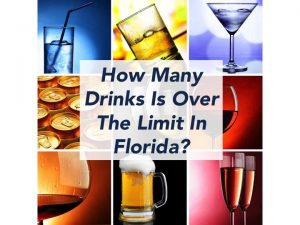What is the Alcohol Legal Limit?
In Florida, a law enforcement officer can make an arrest for Driving Under the Influence (DUI) based on the officer’s observations of indicators of impairment. An officer may use general observations and Field Sobriety Tests to reach probable cause for a DUI arrest.
After the arrest for DUI has been made, the officer will ask for a breath test. In Florida, 0.08 BAC (Blood Alcohol Concentration) is the legal limit.
But just how many drinks get you to 0.08? The answer may surprise you and the answer may be changing.
Before we get into this subject, please bear in mind that individuals metabolize alcohol differently based on a number of different factors. This article should not be utilized as a guide to determine how much alcohol an individual can consume under the law. It is provided for informational purposes only. Do not drink and drive a vehicle.
As a baseline for the discussion, consider that one drink equals one of the following:
- 1.5 ounces of 80-proof liquor (40% alcohol)
- 12 ounces of beer (4.5% alcohol)
- or 5 ounces of wine (12% alcohol)
Surprisingly, for men, it only takes 2-3 drinks to be at or above the legal limit of 0.08 depending on body weight and a number of other factors such as metabolism, the last time the individual has eaten, age, fat/muscle content, and a variety of other factors.
For women, just 2 drinks could put the individual at or above the legal limit.
To illustrate the various thresholds, consider (BUT DO NOT RELY ON FOR LEGAL PURPOSES), the following charts produced by the Texas Alcoholic Beverage Commission (TABC):

Recently the U.S. government commissioned a report by a panel of the National Academies of Sciences, Engineering, and Medicine which made a recommendation to LOWER drunk driving BAC thresholds. The panel recommended that the 0.08 threshold be lowered to 0.05. The panel made this recommendation because of the 10,000 alcohol-impaired driving deaths in the United States each year.
That would mean that men could reach the 0.05 threshold in 1-2 drinks, while women would potentially be at the threshold after just 1 drink. Already, Utah has lowered its legal limit to 0.05 (goes into effect 12/30/18).
The National Highway Safety Traffic Administration (NHSTA) believes that there are significant concerns for coordination and judgment under the 0.08 current limit:
The Effects of Blood Alcohol Concentration
| BLOOD ALCOHOL CONCENTRATION (BAC) IN G/DL | TYPICAL EFFECTS | PREDICTABLE EFFECTS ON DRIVING |
|---|---|---|
| .02 | Some loss of judgment; relaxation, slight body warmth, altered mood | A decline in visual functions (rapid tracking of a moving target), inability to perform two tasks at the same time (divided attention) |
| .05 | Exaggerated behavior, may have a loss of small-muscle control (e.g., focusing your eyes), impaired judgment, usually good feeling, lowered alertness, the release of inhibition | Reduced coordination, reduced ability to track moving objects, difficulty steering, reduced response to emergency driving situations |
| .08 | Muscle coordination becomes poor (e.g., balance, speech, vision, reaction time, and hearing), harder to detect danger; judgment, self-control, reasoning, and memory are impaired | Concentration, short-term memory loss, speed control, reduced information processing capability (e.g., signal detection, visual search), impaired perception |
| .10 | Clear deterioration of reaction time and control, slurred speech, poor coordination, and slowed thinking | Reduced ability to maintain lane position and brake appropriately |
| .15 | Far less muscle control than normal, vomiting may occur (unless this level is reached slowly or a person has developed a tolerance for alcohol), major loss of balance | Substantial impairment in vehicle control, attention to driving task, and in necessary visual and auditory information processing |
Keep in mind that there are a variety of factors that influence an individual’s BAC levels including age, gender, rate of consumption, the strength of the drink, body type, BMI, metabolism, the current state of hydration, emotional state, medications consumed, the last time food has been consumed, carbonation of drinks, alcohol tolerance, and overall health.
If you have been stopped and arrested for Driving Under the Influence (DUI) you should consult with a criminal defense attorney who can explain the criminal justice process and potential consequences. Contact the Morris Law Firm at (727) 592-5885, Option 1 for New Clients, for a strategic review of your DUI or criminal case and potential defenses. The Morris Law Firm represents clients throughout the Tampa Bay Area, including Pinellas, Hillsborough, Sarasota, Pasco, and Manatee counties, and is located in St. Petersburg, Florida.

